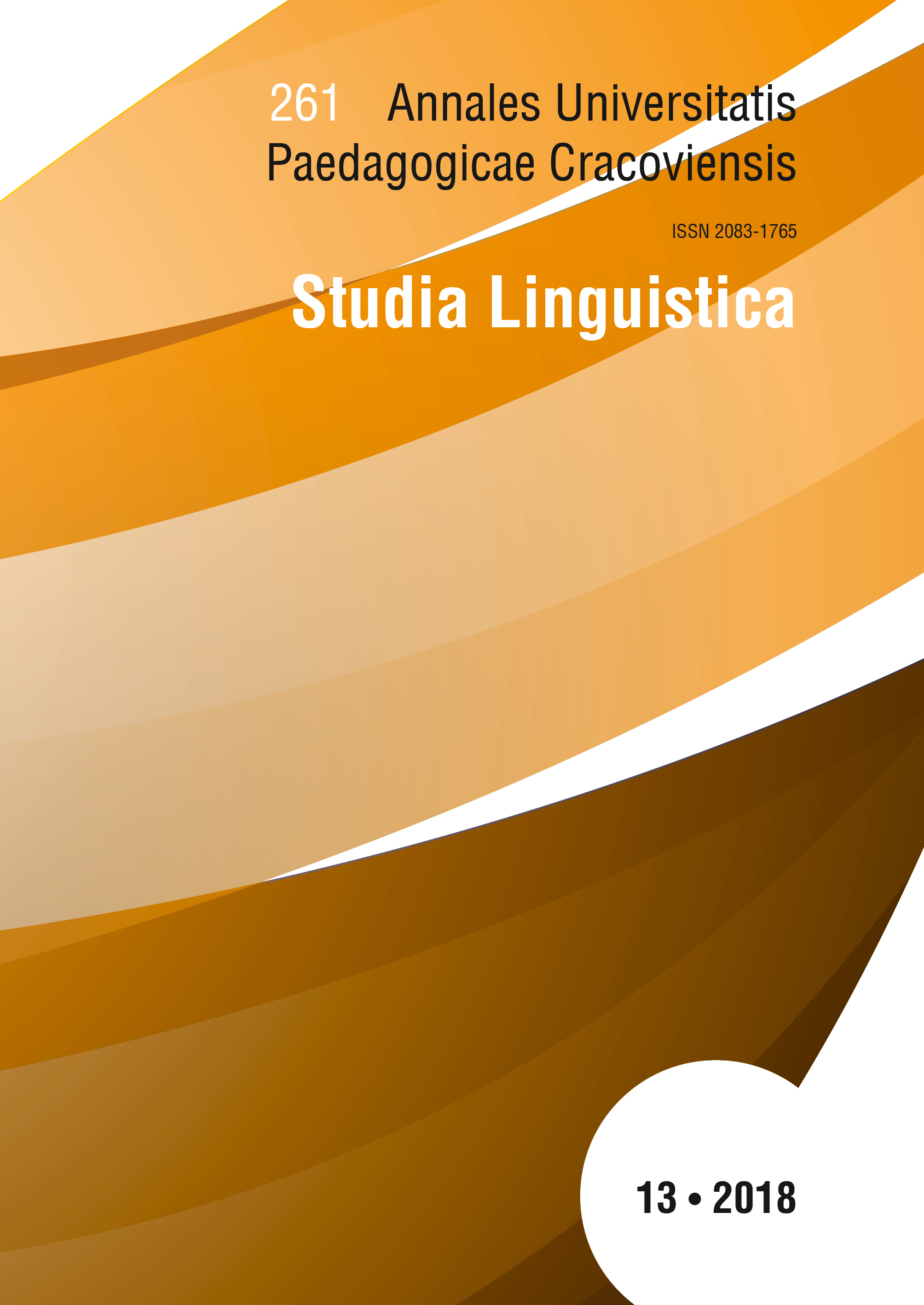Gdy pisarz staje się dziennikarzem. Kilka uwag o „Gazecie Pisarzy”
Main Article Content
Abstrakt
The article stems from a media linguistic perspective and serves as a case study for comparing the roles of a journalist and a writer. The author chose a textual experiment for that purpose, namely the 23-24 April 2016 edition of Gazeta Wyborcza, a Polish daily. On that day the paper turned into Writers’ Newspaper and was prepared in full by several dozen writers from Poland and abroad. The project’s aim was to promote reading the press and literature. The author analysed metatextual and paratextual elements along with self-commentaries regarding the project. The results show the experiment indicated the communicative specificity of the journalistic profession: the particularities of the editorial office, the importance of the topic, of character limits and fact-checking. As a communication experiment, the newspaper underlined the interactive nature of the modern-day press and its openness to the reader.
Downloads
Article Details
Autor, zgłaszając tekst do redakcji czasopisma „Annales Universitatis Paedagogicae Cracoviensis. Studia Linguistica”, zaświadcza, iż jest on rezultatem wyłącznie jego własnej twórczości, że treść artykułu nie była dotychczas publikowana oraz że utwór nie narusza w żadnym stopniu praw autorskich ani praw pokrewnych innych osób, jak również innych praw osób trzecich, a także, że niczyje prawa do utworu (lub jego jakiejkolwiek części) nie zostały pominięte. Po podpisaniu umowy prawa majątkowe do opublikowanych materiałów zostają przeniesione na Wydawnictwo Naukowe Uniwersytetu Komisji Edukacji Narodowej w Krakowie.
Rocznik „Annales Universitatis Paedagogicae Cracoviensis. Studia Linguistica” to czasopismo o otwartym dostępie, a cała jego zawartość jest udostępniana bezpłatnie dla użytkowników i instytucji na zasadach licencji Creative Commons CC-BY-NC-ND 4.0 (uznanie autorstwa, użycie niekomercyjne, bez utworów zależnych). Na podstawie tej licencji autorzy zgadzają się, że ich prace mogą być zgodnie z prawem ponownie wykorzystywane do jakichkolwiek celów, za wyjątkiem celów komercyjnych, bez konieczności uzyskania uprzedniej zgody ze strony autora lub wydawcy. Każdy może prace te czytać, pobierać, kopiować, drukować, rozpowszechniać oraz przetwarzać, pod warunkiem poprawnego oznaczenia autorstwa oraz oryginalnego miejsca publikacji. Publikowanych tekstów nie można wykorzystywać do tworzenia utworów zależnych (np. do tłumaczenia ich i publikowania w innym języku bez zgody wydawcy). Jest to zgodne z definicją otwartego dostępu BOAI (Budapest Open Access Initiative) „Studia Linguistica”nie pobiera opłat za składanie artykułów ani ich przetwarzanie.
Autor, przesyłając artykuł do redakcji „Studia Linguistica”, bezwględnie zgadza się z poniższymi punktami:
-
Oświadczam, że jestem Autorem lub Współautorem nadesłanego tekstu. Przesłany tekst nie był nigdzie publikowany, jest całkowicie oryginalny i nie narusza w żadnym stopniu praw autorskich ani praw pokrewnych innych osób, jak również innych praw osób trzecich, a także, że niczyje prawa do utworu nie zostały pominięte.
-
Oświadczam, że nadesłany tekst nie został złożony do recenzji lub/i publikacji w innym czasopiśmie.
-
Przyjmuję do wiadomości, że Autor ponosi pełną odpowiedzialność za każdy przypadek plagiatu, niezależnie od tego, czy został on wykryty podczas procesu recenzji, czy po publikacji w „Studia Linguistica”.
-
Oświadczam, że ponoszę pełną odpowiedzialność finansową i prawną za wszelkie roszczenia związane z utworem.
-
Potwierdzam uznanie wszystkich źródeł danych wykorzystanych i cytowanych w badaniach.
-
Potwierdzam, że artykuł został wykonany z należytą starannością zgodnie ze standardami edytorskimi „Studia Linguistica”.
Bibliografia
Bauer Z., 2008, Gatunki dziennikarskie, [w:] Dziennikarstwo i świat mediów, red. Z. Bauer, E. Chudziński, Kraków, s. 255–280.
Google Scholar
Duszak A., 1998, Tekst, dyskurs, komunikacja międzykulturowa, Warszawa.
Google Scholar
Jachimowski M., 2006, Cechy zawodu dziennikarskiego i jego wyznaczniki strukturalne, [w:] Współczesny dziennikarz i nadawca, red. M. Gierula, Sosnowiec, s. 31–48.
Google Scholar
Koziołek R., 2015, Dobrze się myśli literaturą, Wołowiec.
Google Scholar
Loewe I., 2007, Gatunki paratekstowe w komunikacji medialnej, Katowice.
Google Scholar
Michalczyk S., 2008, Społeczeństwo medialne. Studia z teorii komunikowania masowego, Katowice.
Google Scholar
Skowronek B., 2013, Mediolingwistyka. Wprowadzenie, Kraków.
Google Scholar
Skowronek B., 2014, Mediolingwistyka. Teoria. Metodologia. Idea, „Postscriptum Polonistyczne”, 2 (14), s. 15–26.
Google Scholar
Sobczak J., 2004, Dziennikarstwo – zawód, misja czy powołanie?, [w:] Media i dziennikarstwo na przełomie stuleci. Wybrane zagadnienia, red. W. Cisak, Poznań.
Google Scholar
Szot L., 2015, Dziennikarstwo jako zawód inteligencki, [w:] Zawód dziennikarz. Między misją a profesją, red. B. Brodzińska, M. Jeziński, M. Mateja, Toruń, s. 17–40.
Google Scholar
Ślawska M., 2014, Formy dialogu w gatunkach prasowych, Katowice.
Google Scholar
Taczkowska J., 2012, Zawód dziennikarza w Polsce. Między misją a posłannictwem, Bydgoszcz.
Google Scholar
Wierzbicka A., 1971, Metatekst w tekście, [w:] O spójności tekstu, red. M.R. Mayenowa, Wrocław, s. 105–121.
Google Scholar
Witosz B., 2001, Metatekst – w opisie teoriotekstowym, stylistycznym i pragmalingwistycznym, [w:] Stylistyka a pragmatyka, red. B. Witosz, Katowice, s. 73–81.
Google Scholar
Żydek-Bednarczuk U., 2013, Wibrująca tożsamość dziennikarzy, [w:] Transdyscyplinarność badań nad komunikacją medialną, t. 3: Tożsamość dziennikarza, red. M. Kita, M. Ślawska, Katowice, s. 14–24.
Google Scholar
Źródła internetowe
Google Scholar
http://www.press.pl/tresc/48572,onet-i-agora-z-nagrodami-inma- global-media-a-ward-2017
Google Scholar
http://wyborcza.pl/7,75410,21855724,gazeta-pisarzy-nagrodzona- w-prestizowym-kon-kursie-inma-global.html
Google Scholar
http://wyborcza.pl/1,75410,19961019,gazeta-pisarzy-kto-zrobi-z- nami-sobotnia-wy-borcza-lista.html
Google Scholar
http://wyborcza.pl/1,75410,19934402,wojciech-kuczok-dane-szacunkowe.html
Google Scholar
http://wyborcza.pl/5,140981,19961300.html
Google Scholar
http://wyborcza.pl/1,75410,19966820,jak-pisarze-napisali- nam-sobotnia-wyborcza.html
Google Scholar
http://wyborcza.pl/1,75410,19980022,pisarze-wspominaja-jak- robili-gazete-pisarzy-i-jak-udalo.html
Google Scholar
http://wyborcza.pl/1,75410,19958161,dlaczego-wyborcza-zamieni- sie-w-sobote-w-ga-zete-pisarzy.html
Google Scholar
